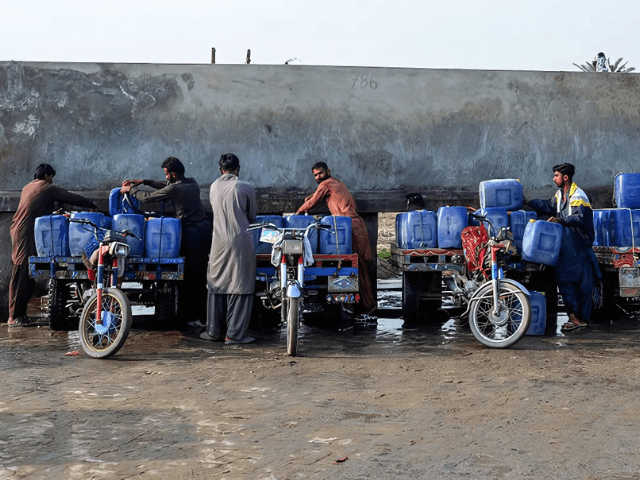In Jacobabad, one of Pakistan’s most popular cities, growing temperatures and the decrease in water supplies are pushing the community towards a crisis.
Jacobabad with solar team often exceeds 50 degrees Celsius (122 degrees Fahrenheit) during intense heat waves, which leads to critical health problems such as dehydration and stroke.
The municipal Jacobabad water system, financed in part by a USAID subsidy of $ 66 million in 2012, provides essential clean water to around 350,000 residents. The project pumps 1.5 million gallons of purified water daily from a channel located 22 kilometers (14 miles) away, which helps relieve pressures of severe water scarcity.
However, the freezing of foreign aid of the United States, which includes $ 1.5 million designated for the continuous operation of the project, now threatens the entire infrastructure, leaving the vulnerable community.
The hands, the non -profit organization Pakistani that supervises the project, warned that without this critical financing, the water system could be closed in a matter of months. “Since everything is suspended, we have to withdraw our staff, and the project will probably stop working,” said Hands CEO, Shaikh Tanveer Ahmed. Freezing has left the local government in charge, but with little capacity or experience to administer such an intricate system.
Jacobabad’s vulnerability to climate change is becoming more severe. Recent weather reports show that rain in the province of Sindh has dropped 52%, and the city faces a moderate drought in the coming months.
For residents as tafail Ahmed, access to clean water is not only important; It is essential for survival. “If the water supply is cut, survival will be a challenge,” said Ahmed. “Water is the most essential for life.”
The freezing of American aid comes at a time when Jacobabad, as much of Pakistan, is increasingly affected by climate change. Pakistan, which contributes less than 1% of world emissions of greenhouse gases, is one of the nations most affected by the increase in temperatures and extreme climatic events. With heat waves they become more frequent and intense, Jacobabad dependence on water supply systems financed by international aid has never been more critical.
Before the municipal system of the city, many residents had to rely on the private donkey oil tankers, which charge up to 10 times more than the local water service. These oil tankers often deliver contaminated water with harmful substances such as arsenic. As the 18 -year -old student, Noor Ahmed, recalls, “before, our women had to walk for hours to collect water. Now, we have a reliable supply. “
However, with the potential end of the ahead water supply, Abdul Ghani, a local activist, warned that cutting the project funds would have dire consequences. “If the supply is cut, it will severely affect the public. We can’t pay alternatives, ”he said.
This crisis highlights the broader impacts of the United States foreign policy decisions on global climatic adaptation efforts. Frozen help underlines the fragility of global associations, particularly for countries in the first line of climate change, such as Pakistan. Without continuous support, communities in Jacobabad and similar cities can face the devastating effects of climate change without the necessary resources to face.
“This water supply cannot be stopped,” said Sadruddin Lashari, a 55 -year -old local resident. “Without it, we will fight to survive heat.”
While Jacobabad struggles to maintain his water supply, the urgent need for continuous international support is clear. The situation serves as a marked reminder that climate change requires global cooperation, and foreign aid is essential to help vulnerable communities such as Jacobabad to adapt and survive.




